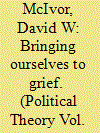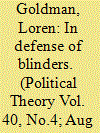|
|
|
Sort Order |
|
|
|
Items / Page
|
|
|
|
|
|
|
| Srl | Item |
| 1 |
ID:
113882


|
|
|
|
|
| Publication |
2012.
|
| Summary/Abstract |
I argue here that a clearer conception of Gandhi's nonviolence is required in order to understand his resonance for contemporary environmentalism. Gandhi's nonviolence incorporates elements of both the brahmin or ascetic, as well as the ksatriya or warrior. Contemporary environmental movements by and large over-emphasize the self-abnegating, self-denying and self-scrutinizing ascetic components of Gandhi's thought, to the neglect of the confrontational and warrior-like ones. In so doing, they often also over-emphasize the ethical dimension of Gandhi's thought, missing the discursive political dimension with which this Gandhian ethics is interwoven. I will argue here that the warrior-like and confrontational political aspect of Gandhi's nonviolence must be brought to the fore in discussions of environmentalism. In so doing, Gandhi can be read as an advocate of a certain form of "ecological" citizenship, requiring both the scrutiny of one's bodily consumptive behaviours, as well as the placement of one's body on the frontlines of aggressive political contestation.
|
|
|
|
|
|
|
|
|
|
|
|
|
|
|
|
| 2 |
ID:
113881


|
|
|
|
|
| Publication |
2012.
|
| Summary/Abstract |
Within political theory there has been a recent surge of interest in the themes of loss, grief, and mourning. In this paper I address questions about the politics of mourning through a critical engagement of the work of Judith Butler. I argue that Butler's work remains tethered to an account of melancholic subjectivity derived from her early reading of Freud. These investments in melancholia compromise Butler's recent ethico-political interventions by obscuring the ambivalence of political engagements and the possibilities of achieving and sustaining non-dogmatic identities. To overcome this impasse I argue for an alternative framing of mourning by turning to the psychoanalytic theory of Melanie Klein. An account of mourning that leans upon Klein's work cashes in on the ethical and political promises that are immanent yet unrealized in Butler's recent work while providing a new orientation for mourning in, and for, democratic politics.
|
|
|
|
|
|
|
|
|
|
|
|
|
|
|
|
| 3 |
ID:
113884


|
|
|
|
|
| Publication |
2012.
|
| Summary/Abstract |
Kant's progressive philosophy of history is an integral aspect of his critical system, yet it is often ignored or even treated as an embarrassment by contemporary scholars. In this article, I defend Kant and argue for the continuing relevance of his regulative assumption of historical progress. I suggest, furthermore, that the first-person stance of practical belief exemplified in Kant's conception of hope offers new resources for thinking about the relationship between the ideal and the real in political theory.
|
|
|
|
|
|
|
|
|
|
|
|
|
|
|
|
| 4 |
ID:
113883


|
|
|
|
|
| Publication |
2012.
|
| Summary/Abstract |
The publication in 1869 of Mill's Subjection of Women gave rise to philosophical and political responses beyond Western Europe on the relationship between Westernization and women's rights in developing, colonial, and post-colonial countries. Through the first comparative study of the Subjection of Women alongside the forewords to six of its earliest non-Western European editions, we explore how this book provoked local intellectuals in Russia, Chile, and India to engage its liberal utilitarian, imperial, Orientalist, and feminist ideas. By showing how Mill's Western European biases and instrumental reasoning establish problematic rhetorical models for women's rights arguments, we are able to explore the ethical dimensions of women's rights issues in the context of cultural and political imperialism. Most importantly, this reception history illustrates how cross-cultural and culturally sensitive dialogue on women's rights can push us beyond Western bias and imperialism in advocating for the end of women's subjection around the globe.
|
|
|
|
|
|
|
|
|
|
|
|
|
|
|
|
|
|
|
|
|